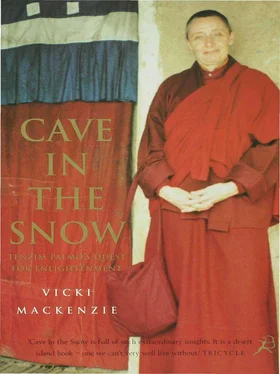He suggested that Tenzin Palmo go to Hong Kong for a couple of months, grow her hair and then proceed on to Japan. She was sorely tempted. ‘I thought, I’m twenty-one and I’ll never, ever be kissed again. I’m too young! I wanted the chance to take care of him, to please him, to be with him. To do that side of things. To have that sort of relationship, to be with someone, taking care – to express myself in that way.I wanted the opportunity to do that, not for ever, but for a time. Being a nun I felt thwarted,’ she said frankly. ‘I was very young. And again I had the thought that maybe we could live together for a while until the relationship went sour and then I could take up my role as a nun once more.’
There were other enticements. Back in Dalhousie conditions were dreadful. Khamtrul Rinpoche’s monastery was not yet rebuilt and everybody was living in tents. It was frequently knee-deep in mud, there were no toilets and no drinking water on tap either. The Japanese boyfriend’s parents, on the other hand, had just moved into a new traditional house and had extended an invitation for Tenzin Palmo to stay. She knew she would love it. The inner struggle intensified. Slowly, however, the decision was being made.
‘I thought, in ten years’ time which would I regret the most, the chance of being with the guru and practising dharma or the chance of a little samsaric happiness? And it was so obvious! One has gone through worldly pleasures over and over again and where has it got one? How could that compare to the chance of being with the lama?’ she said.
What finally decided her was the I Ching , the ancient Chinese book of divination. John Blofeld had just finished translating it and Tenzin Palmo was helping him proofread. During the process he had taught her how to set up an I Ching shrine and throw the yarrow sticks, seeing which way they fell to make the hexagrams ready for the reading. She decided to ask the first and only question she would ever ask of the I Ching : should she go on to Japan or back to India? The answer was: ‘Further journey East not advisable. Return to the Sage.’
It could not have been clearer. Tenzin Palmo now knew what course she was going to take. Still, forsaking earthly love was not to be done without sorrow. That night as she was lying in bed in tears thinking of what she had just given up, she prayed to her guru to help her. He heard her call.
‘As I was praying I felt my whole body fill with this golden light coming from my head down to my feet and Khamtrul Rinpoche’s voice said, “Come back to India immediately!” After that I was perfectly happy. I was filled with bliss,’ she explained.
The next day she went out and bought her ticket back to India. She never saw the Japanese boy again.
Chapter Six
Fear of the Feminine
Her decision made, her split resolved, Tenzin Palmo returned to Dalhousie ready to throw herself wholeheartedly into life as a nun and to follow the path to perfection. It was the only thing that she had really wanted all her life. She was dedicated, extraordinarily single-minded and spurred on by the highest of ideals. By rights it should have been the beginning of a glorious vocation, but as it turned out she now entered what was to prove the most miserable phase of her life. It lasted six years.
By some dint of fate (or force of karma) Tenzin Palmo, as Khamtrul Rinpoche’s ‘only nun’, managed to find herself in the bizarre situation of being a lone woman among 100 monks. By absolute accident she had entered the mighty portals of Tibetan monasticism, barred to the opposite sex for centuries.
As the pyramids were to Egypt, so the monasteries were to Tibet. At their grandest they were vast institutions, stretching like towns over the mountain slopes and buzzing with the massed vitality of thousands of monks engaged in the pursuit of spiritual excellence. They had been in situ since the early part of the millennium, gaining steadily in stature and producing some of the finest mystics and scholar-saints the world has ever known. Here, in these academies of Enlightenment, the discipline was rigid, the curriculum impressive. Entering at boyhood, for some twenty-five years (the time necessary to get their Geshe degree) the monks studied such profound subjects as logic and reasoning, the identification of the different types of consciousness, methods for generating single-pointed concentration and ‘formless absorption’. They examined the varying views of Emptiness, the perennial philosophy of the ‘void’ and, when they were developed enough, they were initiated into the esoteric realm of tantra, the secret way, deemed the fastest and therefore most dangerous path of all. And through it all they learnt about Bodhicitta, the altruistic heart without which none of the rest was truly viable. In short the monasteries of Tibet were magnificent, the pride of the nation, and exclusively male.
Into this unadulterated patriarchy marched Tenzin Palmo. Had she not been a Westerner, had she not been recognized as part of Khamtrul Rinpoche’s entourage and had the Tibetans not been in disarray, it would never have happened. It was not, however, a comfortable position to be in. Whether it was simply because they didn’t know what to do with her, or whether it was because since childhood they had been trained to view women with a wary eye (especially young, attractive women), the monks, usually so warm and affectionate, kept Tenzin Palmo at a distance. The effect on the young woman yearning for physical affection, who had just renounced her boyfriend, was devastating.
‘It was terrible. There was this inner pain of loving people so much but not being able to reach out and touch them,’ she explained. ‘It was like having this glass partition down – you could see but you couldn’t get near. It was very painful to be so alienated, especially at that age. It went on for ages and ages. The only person who ever came near me was Khamtrul Rinpoche, who would sometimes give me a big bear hug. I would cry every night, I was so unhappy,’ she recalled.
Her feelings of isolation and rejection were compounded by the fact that, as a woman, she was barred from living with the rest of the community and sharing in their daily activities. Consequently by day she would work as Khamtrul Rinpoche’s secretary in the monastery’s office, and by night she would take herself back to the town, where she lived alone. She rented a quirky little room at the top of a dilapidated house, just big enough to hold a bed, a table and nothing else. Her bath was a cold standpipe, her toilet a bucket. There she ate by herself, slept by herself, belonging to neither the lay community nor the monks.
‘Later people would ask me if I wasn’t lonely in my cave. I never was. It was in the monastery where I was really alone,’ she said.
Ironically, her emotional anguish and her longing for affection finally worked in her favour. She explained: ‘One evening I looked inside and saw this grasping and attachment and how much suffering it was causing me. Seeing it so nakedly at that moment it all fell away. From that moment on I didn’t need to reach out.’
Tenzin Palmo, it seemed, had learnt the lesson of detachment. It was a fundamental Buddhist tenet, deemed essential for getting anywhere on the path to perfection. For how can anyone feel compassion towards all living beings, the Buddha had argued, while in their heart they were dividing them into ‘friend’, ‘enemy’and ’stranger’? Ideally sound it might have been, but detachment was also extremely difficult to attain, for in reality not many human beings actually want to live with that much equanimity. Later Tenzin Palmo was to remark pointedly: ‘People are always asking me how they can give up anger, but no one has yet asked me how to give up desire.’
Читать дальше












